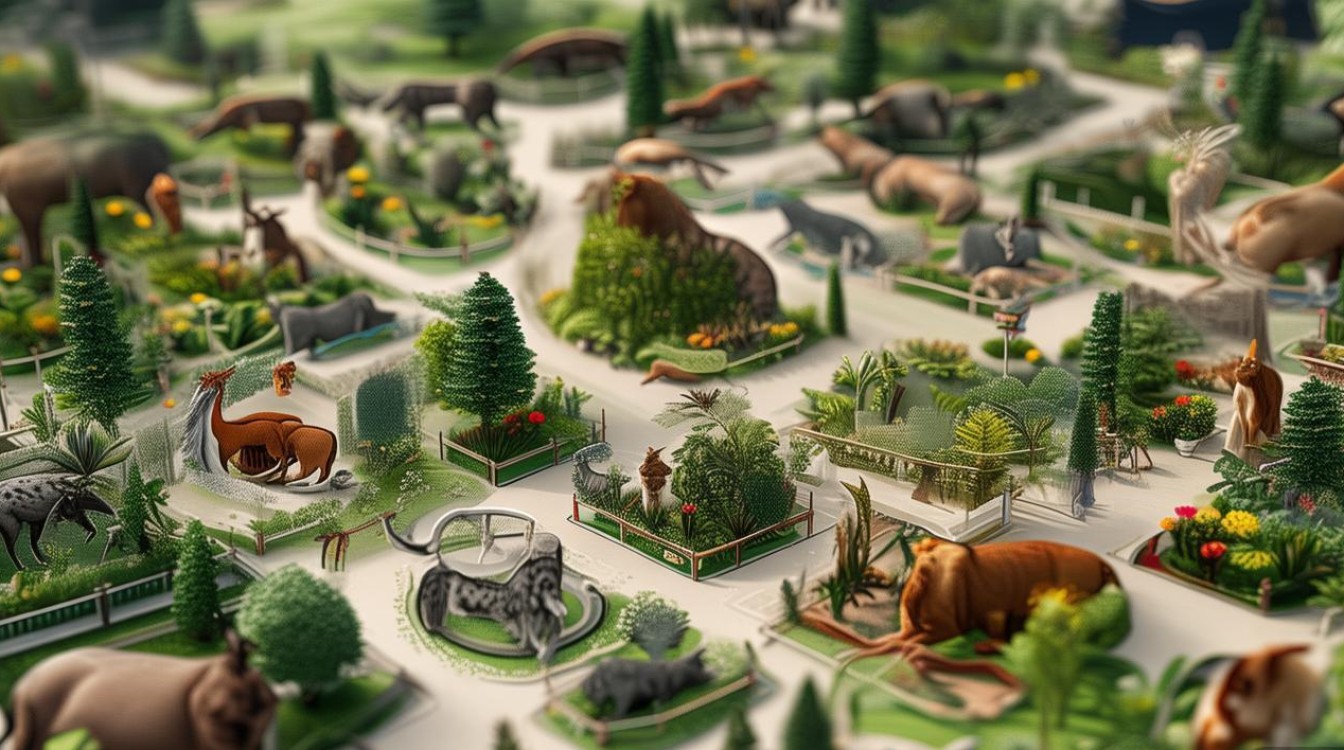下面我将为你提供一个全面的备考指南,包括:

- 题目类型分析
- 核心观点与论点梳理
- 高分范文
- 词汇与短语积累
- 写作思路拓展
题目类型分析
通常以两种形式出现:
双边讨论
Some people think that zoos are cruel and should be closed down. Others believe that zoos can be useful for animal conservation. Discuss both views and give your own opinion. (一些人认为动物园是残忍的,应该被关闭,另一些人则认为动物园对动物保护很有用,讨论双方观点并给出你自己的看法。)
利弊分析
There is a growing public concern over the role of zoos in modern society. Discuss the advantages and disadvantages of keeping animals in zoos. (公众对现代动物园的角色日益关注,讨论将动物关在动物园中的利与弊。)
无论哪种类型,核心都是要辩证地看待问题,不能一边倒。
核心观点与论点梳理
在写作前,你需要建立一个清晰的论证框架,以下是一些核心论点,你可以根据自己的立场进行组合。
正方观点:支持动物园的存在
-
论点1:物种保护与繁育
- 解释:许多濒危物种在野外面临栖息地丧失、盗猎等威胁,动物园为它们提供了安全的庇护所。
- 例子:中国的“大熊猫保护繁育研究中心”、全球范围内的“圈养繁育计划”(Captive Breeding Programs),成功挽救了如普氏野马、麋鹿等物种。
- 延伸:动物园可以进行科学的育种研究,维持物种的遗传多样性,为未来的野外放归做准备。
-
论点2:公众教育与意识提升
- 解释:动物园让公众,尤其是城市里的儿童,有机会亲眼接触到各种动物,这是书本和纪录片无法替代的。
- 例子:通过观察动物,人们能更直观地了解动物的行为、习性和生存现状,从而培养对自然的热爱和保护意识。
- 延伸:动物园可以通过讲解、互动项目和宣传资料,向公众普及保护知识,激发他们为环保事业做出贡献。
-
论点3:科学研究
- 解释:动物园为科学家提供了一个绝佳的平台来研究动物的生理、行为、营养需求等。
- 例子:在可控的环境下研究动物的繁殖、疾病治疗,这些研究成果可以反过来应用于野外保护。
- 延伸:了解动物在圈养环境下的需求,有助于改善所有圈养动物(包括宠物和农场动物)的福利。
反方观点:反对或质疑动物园
-
论点1:动物福利与伦理问题
- 解释:动物园的环境无法模拟动物在辽阔野外中的自然栖息地,空间狭小、缺乏环境丰容,会导致动物出现刻板行为(如来回踱步、自残等),这是一种心理折磨。
- 例子:老虎在笼子里无精打采地来回踱步,大象因为空间不足而表现出攻击性。
- 延伸:将动物当作娱乐商品供人观赏,本身就是一种不道德的行为,侵犯了动物的天性。
-
论点2:教育的局限性
- 解释:动物园展示的是被囚禁的、非自然的动物行为,这可能会给公众,特别是儿童,传递错误的信息,让他们误以为动物在圈养中生活得很好。
- 例子:孩子们看到狮子在懒洋洋地睡觉,可能无法理解它在野外作为顶级捕食者的威猛和生存压力。
- 延伸:这种“动物园式”的教育是肤浅的,远不如通过高质量的纪录片或实地生态旅行更能激发人们对野生动物的尊重。
-
论点3:资源分配问题
- 解释:维持一个动物园的运营成本极高,包括场地建设、动物饲养、兽医护理等,这些巨额资金如果能投入到野外栖息地保护、反盗猎巡逻或社区教育中,可能会产生更大的效益。
- 例子:建造一个现代化场馆的钱,可以用来保护一大片原始森林,或者资助多个护林员团队。
- 延伸:保护的核心应该是保护动物的“家”(栖息地),而不是将动物“请”进人类的“家”。
高分范文
** Some people argue that zoos are inhumane and should be abolished. To what extent do you agree or disagree?
(这是一个“同意与否”的题目,但实际上考察的是辩证思维,一个高分的立场通常是“不完全同意,认为需要改革而非废除”。)
范文:
The role of zoos in contemporary society is a contentious issue, with critics vehemently arguing for their closure on ethical grounds. While I acknowledge the significant concerns regarding animal welfare, I contend that a complete abolition of zoos is not the most pragmatic solution. Instead, the focus should be on reforming these institutions to maximize their benefits for conservation and education while minimizing harm to the animals.
On the one hand, the arguments against traditional zoos are compelling and rooted in a genuine concern for animal rights. The primary criticism is that confining animals, especially wide-ranging species like tigers or elephants, to enclosures that are a fraction of their natural habitats is inherently cruel. This artificial environment often fails to meet the animals' physical and psychological needs, leading to abnormal and stereotypical behaviours such as endless pacing or self-mutilation. Furthermore, the very premise of displaying animals for public entertainment can be seen as a form of exploitation, reducing majestic creatures to mere commodities for human amusement. In this light, the call to shut down all zoos is a morally justifiable stance.
On the other hand, to dismiss zoos entirely is to overlook their indispensable role in the modern conservation toolkit. Firstly, accredited zoos serve as vital arks for endangered species. They run carefully managed breeding programs that have successfully pulled numerous animals back from the brink of extinction, such as the Przewalski's horse and the Arabian oryx. These programs act as a genetic safety net against the catastrophic loss of biodiversity in the wild. Secondly, zoos are powerful educational platforms. They offer a unique, tangible experience that can foster a lifelong passion for wildlife in young visitors, an emotional connection that documentaries or books can rarely replicate. This connection is often the first step in cultivating a generation that is environmentally conscious and committed to protection.
In conclusion, while the ethical objections to keeping animals in captivity are valid and must be taken seriously, I believe that zoos should not be abolished. Rather, they must undergo a fundamental transformation. The priority should shift from entertainment to conservation, education, and research. Modern, reputable zoos should strive to create environments that are as natural and enriching as possible, and their primary mission should be to support global wildlife protection efforts. Only through such reform can zoos justify their existence in the 21st century.
词汇与短语积累
积极词汇 (Pro-Zoos):
- Conservation: n. 保护 (物种、环境)
- Breeding program: n. 繁殖计划
- Endangered species: n. 濒危物种
- Genetic diversity: n. 遗传多样性
- Reintroduction to the wild: 放归野外
- Public awareness: n. 公众意识
- Educational platform: n. 教育平台
- Scientific research: n. 科学研究
- Sanctuary: n. 庇护所,圣地
消极词汇 (Anti-Zoos):
- Inhumane / Cruel: adj. 不人道的,残忍的
- Ethical concern: n. 伦理上的担忧
- Animal welfare: n. 动物福利
- Confinement: n. 监禁,关押
- Enclosure: n. (动物)围栏,圈地
- Natural habitat: n. 自然栖息地
- Stereotypical behaviour: n. 刻板行为
- Exploitation: n. 剥削,利用
- Commodification: n. 商品化
高级连接词与短语:
- Contentious issue: 有争议的问题
- Vehemently argue: 强烈地论证
- On the one hand... on the other hand...: ....
- While I acknowledge... I contend that...: 尽管我承认...但我认为...
- In this light: 从这个角度来看
- To overlook: 忽视
- Indispensable role: 不可或缺的角色
- A genetic safety net: 基因安全网
- Foster a lifelong passion: 培养终身的热情
- Undergo a fundamental transformation: 经历根本性的转变
- Strive to do sth.: 努力做某事
- Justify their existence: 证明











